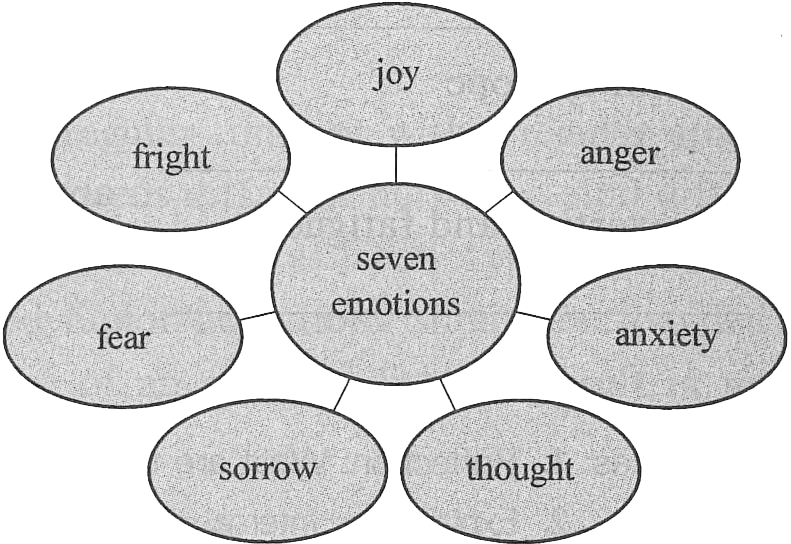
Fig. 5-3 Seven emotions
Text
Internal causes of disease arise within the body, referring chiefly to excessive emotional changes. It is another one of the three causes of disease.

Fig. 5-3 Seven emotions
Seven emotions is a collective term for joy, anger, anxiety, thought, sorrow, fear and fright as listed in Fig. 5-3. They are taken as endogenous factors causing diseases, if in excess.
Generally speaking, excessive anger causes damage to the liver, excessive joy or fright causes damage to the heart, excessive thought causes damage to the spleen, excessive sorrow or anxiety causes damage to the lungs, and excessive fear causes damage to the kidneys.
The mechanism of internal damage by the seven emotions is that they cause visceral qi dynamic disorders.
Anger causes qi to ascend*. When anger is in excess it may cause the liver qi to ascend together with blood, resulting in* irritability*, headache, dizziness, flushed face, bloodshot eyes*, or hematemesis*, even sudden fainting. Joy causes qi to slacken*, and excessive joy may make the heart qi sluggish, resulting in absentmindedness*, palpitations*, insomnia* and even mental disturbance. Sorrow causes qi to disperse*, and excessive sorrow may consume the lung qi, resulting in shortness of breath, listlessness* and fatigue. Fear causes qi to descend*, and when fear is in excess it may cause the kidney qi to sink, resulting in incontinence* of urine and stools, spermatorrhea*, or even syncope*. Fright causes derangement of qi*, and when fright occurs suddenly it may disturb the heart qi, resulting in palpitations, insomnia, or mental confusion. Thought causes qi to bind* and if it is in excess it may cause stagnation of the spleen qi and damage to the transportation and transformation function of the spleen, resulting in torpid intake*, and abdominal distention*. Anxiety causes qi to be depressed*, and if it is in excess it may cause damage to the lungs, resulting in oppression* in the chest and sighing.